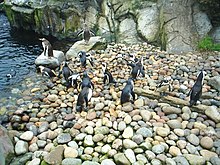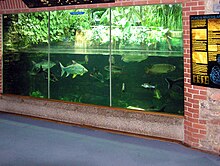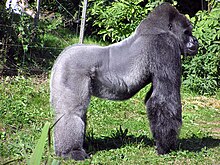Bristol Zoo: Difference between revisions
No edit summary Tag: Reverted |
Undid revision 1089929227 by 2409:4041:D88:D37F:4922:C83A:F7AC:F137 (talk) Wikipedia:Weblinks |
||
| Line 48: | Line 48: | ||
Opened in 1836 by the Bristol, Clifton and West of England Zoological Society, Bristol Zoo is the world's oldest provincial zoo. It is a [[Victorian era|Victorian]] walled [[zoo]] located between [[Clifton Down]] and [[Clifton College]], near Brunel's [[Clifton Suspension Bridge]]; it covers a small area by modern standards, but with a considerable number of [[species]]. In the 1960s the zoo came to national prominence by appearing in the UK television series, ''[[Animal Magic (TV series)|Animal Magic]]'', hosted by the comic animal 'communicator', [[Johnny Morris (television presenter)|Johnny Morris]]. Morris would play keeper and voice all the animals there. |
Opened in 1836 by the Bristol, Clifton and West of England Zoological Society, Bristol Zoo is the world's oldest provincial zoo. It is a [[Victorian era|Victorian]] walled [[zoo]] located between [[Clifton Down]] and [[Clifton College]], near Brunel's [[Clifton Suspension Bridge]]; it covers a small area by modern standards, but with a considerable number of [[species]]. In the 1960s the zoo came to national prominence by appearing in the UK television series, ''[[Animal Magic (TV series)|Animal Magic]]'', hosted by the comic animal 'communicator', [[Johnny Morris (television presenter)|Johnny Morris]]. Morris would play keeper and voice all the animals there. |
||
The zoo's official name is |
The zoo's official name is Bristol Zoological Gardens ('Bristol Zoo Gardens' for commercial purposes). This is not in recognition of the flower displays but recognises the first use of that title at the [[London Zoo|Regent's Park Zoological Gardens]]. Bristol, like its earlier London counterpart, includes several original buildings which have been praised for their architectural quirks, despite being unsuitable for the care of animals; the (former) Giraffe House<ref>{{cite web | title= Bristol Zoological Gardens, Giraffe House | work=historicengland.org.uk | url=https://historicengland.org.uk/listing/the-list/list-entry/1205725 | access-date=18 December 2006}}</ref> joins the main entrance lodge<ref>{{cite web | title=Bristol Zoological Gardens entrance | work=historicengland.org.uk | url=https://historicengland.org.uk/listing/the-list/list-entry/1202091 | access-date=18 December 2006}}</ref> and the south gates on Guthrie Road<ref>{{cite web | title=South entrance gates and screen walls to Bristol Zoological Gardens | work=historicengland.org.uk | url=https://historicengland.org.uk/listing/the-list/list-entry/1279642 | access-date=18 December 2006}}</ref> as a Grade II [[listed building]]. The old Monkey Temple, resembling a southern-Asian temple, is now home to an exhibit called "Smarty plants", an interactive exhibit which shows how plants use and manipulate animals to survive. |
||
The zoo also has breeding firsts, including the first [[black rhino]] born in Britain in 1958, the first [[squirrel monkey]] born in captivity in 1953 and the first [[chimpanzee]] born in Europe in 1934. |
The zoo also has breeding firsts, including the first [[black rhino]] born in Britain in 1958, the first [[squirrel monkey]] born in captivity in 1953 and the first [[chimpanzee]] born in Europe in 1934. |
||
Revision as of 11:44, 26 May 2022
| Bristol Zoo | |
|---|---|
 | |
 Main entrance | |
 | |
| 51°27′48″N 2°37′20″W / 51.46333°N 2.62222°W | |
| Date opened | 1836 |
| Location | Clifton, Bristol, England |
| Land area | 12 acres (4.9 ha) |
| No. of animals | 7155 (2007)[2] |
| No. of species | 419 (2007) |
| Annual visitors | 478,126 (2018)[1] |
| Memberships | The Bristol, Clifton and West of England Zoological Society |
| Major exhibits | Zona Brazil, Seal and Penguin Coasts, Gorilla Island |
| Website | www |
Bristol Zoo is a zoo in the city of Bristol in South West England. The zoo's stated mission is to "maintain and defend” biodiversity through breeding endangered species, conserving threatened species and habitats and promoting a wider understanding of the natural world".[3]


The mammal collection at the zoo numbers around 300, representing 50 species, including: gorillas, Asiatic lions, goodfellow's tree-kangaroo, and red pandas. Among species now on view at Bristol which are rare or absent in other UK zoos are Livingstone's fruit bats, aye ayes and quolls.
The zoo's Twilight Zone was the first of its kind when it opened, there are many other indoor exhibits including an insect and reptile house and aquarium meanwhile outside there are several aviaries and a seal and penguin enclosure. The lakes' islands are home to gorillas, golden lion tamarins, golden-headed lion tamarins, gibbons and squirrel monkeys.
The Zoo announced on 27 November 2020 that after more than 185 years its main centre in Clifton would close in late 2022, with its animals moving to its Wild Place Project site close to the M5 motorway and the zoo reopening there in early 2024.[4][5]
Animal exhibits
- Seal and Penguin Coasts is a major attraction at the zoo; opened in 1999, it allows South American fur seals and African penguins to be watched both above and below the water. The most notable of these African Penguins being CGP Grey the penguin named after internet personality CGP Grey, CGP Grey the penguin died in 2017 (No exact date was given but was first reported on May 13, 2017).[6] The two pools contain 145,000 imperial gallons (660,000 L) of salt water, with waves, waterfalls, rocks and pebble beaches to simulate the natural habitat. The exhibit has a large net over the top to allow Inca terns and common eiders to be kept in the same enclosure.
- Gorilla Island is home to a family of western lowland gorillas. One silverback, Jock as well as Kera, Kala and Touni. In February 2016, Kera's first baby Afia was born after an emergency caesarean section. In April 2017, Touni gave birth to baby Ayana. In August 2020, Kala gave birth to a baby Hasani. Also in December 2020, Touni gave birth to her second baby called Juni. As well as an indoor house, they have a large island. Despite the gorilla's herbivorous diet, keepers do not enter the same space as the apes. This is because not only is there a great risk of injury with these powerful primates, but they also want to let the gorillas socialize on their own without human interference.
- The Top Terrace is one of the oldest parts of the zoo. It is home to a pair of Asiatic lions, keas, red pandas, Livingstone's fruit bats, and Greater Flamingos.
- The Reptile House houses a collection of reptiles and amphibians. The house itself is heated and gives a sense of the heat of the rainforest. There are three sections to the house: Desert (Gila monsters, geckos and tortoises), Rainforest (dwarf crocodiles, terrapins and snakes) and the Rearing Room where visitors can view the raising of reptiles and amphibian and also learn about the zoo's conservation work. Outside, but still considered part of the reptile house, is a giant tortoise and rhinoceros iguana enclosure where the animals have access to a heated indoor house and an outdoor enclosure.
- The Aquarium has around 70 species of fish. The aquarium has three sections: The Amazon River (catfish, pacu and piranha), Africa (cichlids) and the coral reef (seahorses, corals and various species of fish). On the outside of the building there is a water sculpture. There are several exhibits of conservation significance on view. Notably, there is a display of endangered cichlids from Lake Barombi Mbo in Cameroon and a display of goodeids from Mexico and paddlefish and alligator gar from North America.

- Bug World, the zoo's collection of invertebrates, includes species such as Partula snails, stick and leaf insects and corals. Other displays include tarantulas, giant millipedes, honey bees, leaf-cutting ants and Lord Howe Island stick insects. Bug World also houses the Critically Endangered Desertas Wolf Spider. Previous displays included peacock mantis shrimp and black widow spiders.
- Monkey Jungle opened in 2006 featuring four new exhibits replacing the old monkey house. An enclosure is home to crowned lemurs and ring-tailed lemurs where visitors can walk in with the lemurs without any boundaries. The other enclosures are home to brown spider monkeys and lion-tailed macaques. There is also a nearby enclosure for black howler monkeys and six-banded armadillos. The islands opposite Gorilla Island house a family of squirrel monkeys, a pair of agile gibbons and also golden-headed lion tamarins.
- The Butterfly House is made up of an undercover walk-through in a sustainably-heated, climate-controlled polytunnel. [1]. Species on show include the blue morpho butterflies, glasswings, leopard lacewings and atlas moths. The exhibit is linked to sustainable butterfly producers in Costa Rica. The zoo also supports work to protect the rare silky wave moth in Avon Gorge.
Butterfly Forest

History
Opened in 1836 by the Bristol, Clifton and West of England Zoological Society, Bristol Zoo is the world's oldest provincial zoo. It is a Victorian walled zoo located between Clifton Down and Clifton College, near Brunel's Clifton Suspension Bridge; it covers a small area by modern standards, but with a considerable number of species. In the 1960s the zoo came to national prominence by appearing in the UK television series, Animal Magic, hosted by the comic animal 'communicator', Johnny Morris. Morris would play keeper and voice all the animals there.
The zoo's official name is Bristol Zoological Gardens ('Bristol Zoo Gardens' for commercial purposes). This is not in recognition of the flower displays but recognises the first use of that title at the Regent's Park Zoological Gardens. Bristol, like its earlier London counterpart, includes several original buildings which have been praised for their architectural quirks, despite being unsuitable for the care of animals; the (former) Giraffe House[7] joins the main entrance lodge[8] and the south gates on Guthrie Road[9] as a Grade II listed building. The old Monkey Temple, resembling a southern-Asian temple, is now home to an exhibit called "Smarty plants", an interactive exhibit which shows how plants use and manipulate animals to survive.
The zoo also has breeding firsts, including the first black rhino born in Britain in 1958, the first squirrel monkey born in captivity in 1953 and the first chimpanzee born in Europe in 1934.
In December 2014, the zoo lost three endangered animals after two fatal accidents, including one involving a male Warty Pig which killed its own offspring and afterwards attacking its mate, who had to be put down due to the injuries. The keepers were not aware that they had mated, nor that the female was due to give birth. In a separate incident a few days later, a Golden Lion Tamarin fell from a branch in its enclosure into some water, where it became stuck and eaten by the zoo's group of North American Otters. Both incidents were described as unprecedented, unheard of and freak accidents by the zoo staff.[10]
Conservation
Bristol Zoo supports wildlife conservation, education and breeding programmes worldwide. For example, Bristol works with other zoos around the world to breed lemurs in captivity. Native to Madagascar, the lemurs are critically endangered because their forest habitat is being destroyed.
Bristol Zoo supports the UK/US charity Ape Action Africa, which rescues and rehabilitates primates in Cameroon, West Africa.[11]
Closer to home, the zoo has helped to reintroduce the water vole and the white-clawed crayfish to parts of Southern England.
Wild Place Project
A number of mammals are kept on a site to the north of Bristol and there are plans to relocate many more species to the Hollywood Tower estate near Cribbs Causeway, as part of a second zoo.
The new site is called the Wild Place Project, and is designed to house larger animals than the existing Bristol Zoo. The zoo is split into biomes, representing species found only in specific habitats. Current areas include: Bear wood, Gelada rocks, Discover Madagascar and Benoue National Park. The species list currently includes: red river hog, Sudan cheetah, zebra, common eland, gelada baboon, Kirk's dik-dik, Reticulated giraffe, wolverine, Eurasian lynx, grey wolf, and brown bear.
Some of the biomes rumoured to be included are: Central American Swamp, Sumatra Tropical Forest, Nepal Riverine Forest, Indian Coral Reef, Congo Tropical Forest and British Wetlands.
Confirmed animals include Western lowland gorilla, Collared mangabey, African grey parrots, Slender-snouted crocodiles, Eastern black rhinoceros, Ostrich and Red panda along with the animals in the new conservation breeding centre
The species list for each ecosystem has not yet been finalized, but is likely to include Manatees, chimpanzees, bongo, Sumatran tiger, Sumatran orangutan, gibbons, jaguars, giant anteaters, Sulawesi crested macaque, Squirrel monkeys, Warthog, Asiatic lion, Kudu, African hunting dog, Hamlyn's Monkey, Black and white colobus, Mandrill, Toco Toucan and Malayan Tapir
The site officially opened on 22 July 2013 as Wild Place Project.[12]
Future plans include a Bristol Zoo-managed conservation breeding centre with climate-controlled enclosures, learning centre and conservation medicine centre.[13]
Event hosting
The WOMAD music festival came to the zoo in 2011,[14][15][16][17][18][19] with a subsequent event in 2012.[20][21][22]
Gallery
This section contains an unencyclopedic or excessive gallery of images. |
-
Seal and Penguin Coasts: the "underwater" tunnel, with South American fur seal
-
Greater flamingo (Phoenicopterus roseus)
-
Humour at the zoo
-
Elephant tower sculpture, based on Wendy who died in 2002
See also
References
- ^ "ALVA - Association of Leading Visitor Attractions". www.alva.org.uk. Retrieved 28 July 2019.
- ^ Bristol Zoo Annual Report 2007 Archived 6 June 2007 at the Wayback Machine
- ^ "Bristol Zoological Gardens Strategic Plan 2008-2018". Bristol, Clifton and West of England Zoological Society Limited. Archived from the original on 7 August 2016. Retrieved 5 August 2016.
- ^ [https://www.bbc.co.uk/news/uk-england-bristol-55103745 "Bristol Zoo to leave Clifton site after 185 years", BBC News, 27 November 2020
- ^ Sophie Grubb, "Bristol Zoo closing: Mayor says relocation was 'the very best decision'", Bristol Post, 27 November 2020
- ^ Haran, Brady. "Dr". Hello internet. Hello internet. Retrieved 15 May 2018.
- ^ "Bristol Zoological Gardens, Giraffe House". historicengland.org.uk. Retrieved 18 December 2006.
- ^ "Bristol Zoological Gardens entrance". historicengland.org.uk. Retrieved 18 December 2006.
- ^ "South entrance gates and screen walls to Bristol Zoological Gardens". historicengland.org.uk. Retrieved 18 December 2006.
- ^ "Rare animals killed at Bristol Zoo". BBC News. Retrieved 29 March 2018.
- ^ Bristol Zoo website – Bristol Zoo presents gorilla sculpture to Cameroon school children – 14/04/11 Archived 17 April 2011 at the Wayback Machine. Bristolzoo.org.uk.
- ^ New Bristol attraction opens 22 July | The Wild Place Project Archived 6 August 2013 at the Wayback Machine. Wildplace.org.uk.
- ^ "Bristol Zoo's new home to include some of world's most threatened species". Blooloop. 15 December 2021. Retrieved 15 December 2021.
- ^ Bristol Zoo teams up with Womad for summer spectacular – Bristol24-7 Archived 24 July 2012 at the Wayback Machine. Bristol247.com (17 March 2011).
- ^ AN evening of music from around the world will be staged at Bristol Zoo this summer as it teams up with the WOMAD festival for a unique concert.. This is Bristol (18 March 2011).
- ^ Bristol Zoo teams up with WOMAD to offer a wild music festival – 17/03/11 | Bristol Zoo Archived 22 March 2011 at the Wayback Machine
- ^ Final acts revealed for WOMAD music festival at Bristol Zoo. Visit Bristol.
- ^ Trio of acts complete line-up for zoo's summer world music event Archived 5 May 2013 at archive.today. This is Bristol (24 May 2011).
- ^ Bristol University | School of Biological Sciences | Womad at Bristol Zoo. Bristol.ac.uk (2 June 2011).
- ^ WOMAD Festival returns to Bristol Zoo Gardens for another musical extravaganza – Bristol24-7 Archived 18 January 2013 at archive.today. Bristol247.com (16 March 2012).
- ^ Music festival returns to the zoo. This is Bristol (9 May 2012).
- ^ At Bristol Zoo 2012 » Festivals Archived 16 April 2013 at archive.today. WOMAD (22 June 2013).





